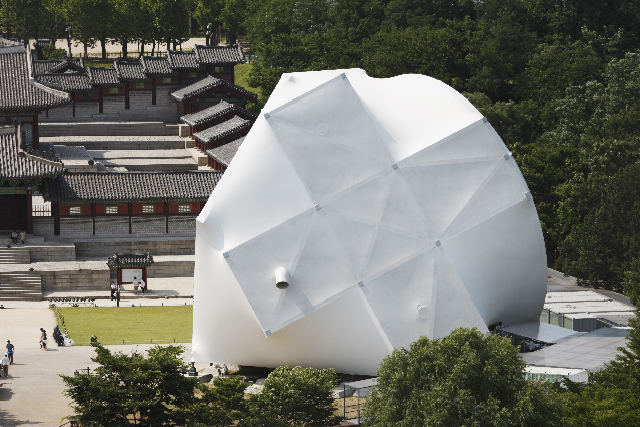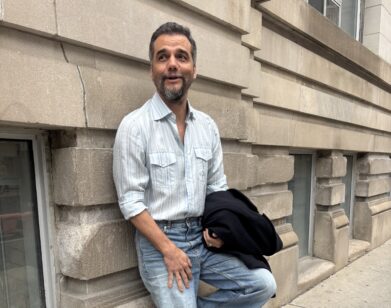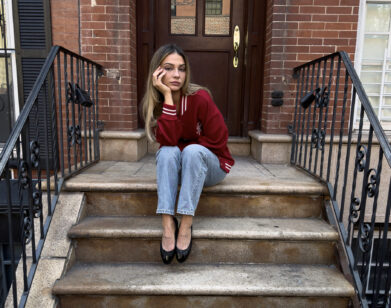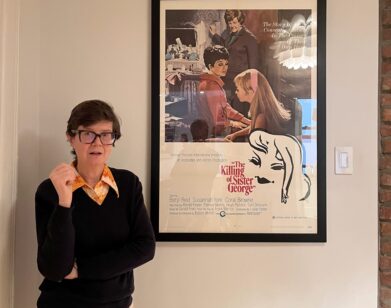Prada Transforms Into Film
Starting this week, the Prada Transformer space in Seoul, open since April, has a cinema. Why? So it can screen 14 awesome movies chosen by director Alejandro González Iñárritu. (The two-week film series was co-curated by former New York Times critic Elvis Mitchell).
“All these films provoked in me appetites that I never knew I had,” Iñárritu (Babel, Amores Perros) says. May they do the same for the rest of us, whether we’re passing through Korea in the next couple weeks or at home with a pile of Netflix.
Here’s the lineup. (Comments are ours.)
Ordet (Carl Dreyer, 1955)
Dreyer is best known for his silent classic The Passion of Joan of Arc, but many consider this one his true masterpiece.
Last Year at Marienbad (Alain Resnais, 1961)
This “high-fashion experimental film” (co-written by Alain Robbe-Grillet) might be “the snow job in the ice palace,” as Pauline Kael famously scoffed. Or it might be the most seductive highbrow romance ever made.
I am Cuba (Mikhail Kalatozov, 1964)
Rediscovered at U.S. film festivals in the nineties, this Soviet-Cuban co-production has also charmed Martin Scorsese and Francis Ford Coppola, who helped secure its DVD release.
Fists in the Pocket (Marco Bellocchio, 1965)
A cinematic hand grenade in its time, Bellocchio’s gleefully perverse portrayal of a middle-class Italian family shocked the Catholic church with themes of matricide, fratricide, and incest.
Aguirre, the Wrath of God (Werner Herzog, 1972)
Legend has it that Herzog threatened to murder temperamental star Klaus Kinski (who plays a crazed Conquistador in the Amazon) on the set. It shows—in a good way.
Seasons of the Year (Artavazd Peleshian, 1975)
If you see one Armenian non-fiction film in your lifetime, it should probably be this one.
Killer of Sheep (Charles Burnett, 1977)
After years of neglect, Burnett’s fictional portrait of a black family in LA finally got a commercial release in 2007.
Padre Padrone (Paolo and Vittorio Taviani, 1977)
Based on the amazing true story of an Italian professor, this Cannes Grand Prix winner is about a young shepherd in rural Sardinia who wants to attend university against his domineering father’s wishes.
Yol (Serif Gören, 1982)
After being arrested by Turkish authorities, filmmaker Yilmaz Güney (an ethnic Kurd) co-directed this Palme d’Or-winning drama from prison.
Mother and Son (Aleksandr Sokurov, 1997)
The almost non-existent narrative and remarkable use of distorting lenses make Sokurov’s tale of a Russian son tending to his mother in her final hours unlike any other.
La Ciénaga (Lucrecia Martel, 2001)
An atmospheric portrait of a dysfunctional family from arguably Argentina’s most exciting living filmmaker, this film’s title translaters as “The Swamp.” Martel’s latest, The Headless Woman, opens August 19 at Film Forum.
Silent Light (Carlos Reygadas, 2007)
Set in a Mennonite community in modern-day Mexico, this tale of faith and redemption marital infidelity has drawn comparisons to Dreyer.
You, the Living (Roy Andersson, 2007)
Whether or not he’s Bergman’s heir apparent, as some have suggested, Andersson’s flair for humane dark comedy is on full display here.
The Good, the Bad and the Weird (Jiwoon Kim, 2008)
A South Korean “western” set in 1930’s Manchuria, Jiwoon’s film shows you don’t have to be Tarantino to pay flamboyant homage to Sergio Leone.
Prada Transformer opened in April with an exhibition of skirts by Miuiccia Prada. The next exhibition, scheduled for mid-August, will be an installation by Berlin-based Swedish artist Nathalie Djurberg.







